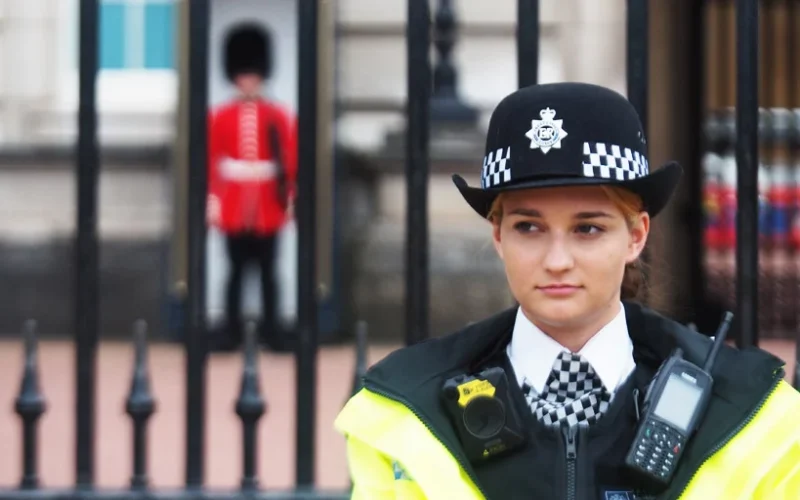Police training in the UK is a rigorous process that takes a lot of time. How long it takes to go through police training is a crucial fact to take into account for those considering a career in law enforcement. Police training can last for two years for those joining through the traditional route and degree holders. For those beginning as apprenticeships, it can last up to three years. A breakdown of details will be conveyed in the writing below.
The training plays a vital role in molding the officers’ abilities to uphold the law, protect communities, and ensure public safety. The police training in the UK has various aspects ranging from communication skills and legal education to physical fitness and having a practical scenario; these are geared to equip the trainees with the necessary expertise to navigate the demands of the job.
This writing will explore the length of police training, the requirements, the challenges that officers face, and the various types of training they undergo before they can confidently hit the streets.
Table of contents
How Long is Police Training in the UK?
Before we delve into the specifics, let’s address the central question: How long does police training in the UK typically take? To give you a quick answer, police training in the UK can vary in duration, but it generally spans approximately 2 to 3 years, depending on the route an individual chooses.
Now, let’s explore the different aspects of police training in detail.
The Various Routes to Becoming a Police Officer
When it comes to becoming a police officer in the UK, there are several routes you can take. The duration of your training will largely depend on the path you choose. Here are the primary routes:
Police Constable Degree Apprenticeship (PCDA)
The PCDA route is designed for individuals who are new to policing. It typically takes 3 years to complete and combines on-the-job training with academic study.
Pre-join Degree in Professional Policing
This route is ideal for those who already possess a degree and want to become police officers. The training duration is approximately two years.
Degree Holder Entry Programme (DHEP)
If you already have a degree in any discipline, the DHEP route allows you to complete your police training in about 2 years.
Special Constable to Police Constable Degree Apprenticeship (Degree Holder Entry Programme)
This route takes about two years to complete for individuals who are already serving as special constables and hold a degree.
Police Now
Police Now is a graduate program that attracts talented individuals from diverse backgrounds. It involves a two-year commitment to serving as a police constable.
The Police Training Process
Now that we’ve explored the various routes, let’s dive into the training process itself. Regardless of the route, all aspiring police officers undergo comprehensive training that covers a wide range of topics and skills, including:
Criminal Law:
Understanding the legal framework within which police officers operate is crucial. Trainees learn about relevant laws and how to apply them in real-world situations.
Community Policing:
Building positive relationships with the community is a cornerstone of modern policing. Officers are trained in community engagement and problem-solving.
Self-Defense and Physical Training:
Physical fitness is essential for police officers. Training includes self-defence techniques, physical fitness routines, and agility tests.
Emergency Response:
Handling emergencies and critical incidents is a fundamental part of the job. Trainees are prepared to respond to a variety of situations, from accidents to criminal activities.
Ethical Decision-Making:
Police officers often face difficult ethical dilemmas. Training includes scenarios that challenge officers to make ethical decisions under pressure.
Real-Life Experience
It’s valuable to hear from individuals who have undergone police training to gain a deeper insight into the process. We interviewed several police officers in the UK to gain firsthand insights into their training experiences.
One officer shared, “The training was intense, but it prepared me well for the challenges of the job. It’s not just about learning the law; it’s about learning how to apply it in the real world while keeping the public’s safety in mind.”
Becoming a police officer after studying an unrelated subject at university typically involves several steps, and the exact timeline can vary depending on your specific circumstances and the country or jurisdiction you’re in. Here’s a general overview of the process:
#1. Meet Basic Requirements:
The first step is to ensure you meet the basic eligibility requirements to become a police officer in your area. These requirements often include being a certain age (usually 18 or older), holding citizenship or residency status, and having a clean criminal record.
#2. Educational Requirements:
While having an unrelated degree is acceptable in many police departments, some may require a minimum level of education, such as a high school diploma or an associate’s degree. Having a bachelor’s degree, even if it’s in an unrelated field, can be an advantage.
#3. Research Requirements by Jurisdiction:
Different police departments or law enforcement agencies may have varying requirements and timelines. Research the specific requirements and application procedures of the department you’re interested in. Check their website or contact their recruitment office for details.
#4. Police Academy Training:
Regardless of your previous education, you’ll need to complete police academy training. This training can last several months and covers a wide range of topics, including law, ethics, physical fitness, and firearms training. The duration may vary by jurisdiction.
#5. Application and Selection Process:
You’ll need to apply to become a police officer, which often involves submitting an application, passing written exams, physical fitness tests, background checks, and interviews. The selection process can take several months.
#6. Conditional Job Offer:
If you pass all the required assessments, you may receive a conditional job offer. This offer is contingent upon completing the police academy training.
#7. Police Academy:
Police academy training typically lasts around 6 to 9 months, but the duration can vary. During this time, you’ll receive intensive training in various aspects of law enforcement.
#8. Probationary Period:
After graduating from the academy, you’ll typically enter a probationary period, during which your performance will be closely monitored. The length of this period can vary, but it is often around 6 to 12 months.
#9. Specialized Training (Optional):
Some police departments offer specialized units or opportunities for additional training. These can add to the timeline if pursued.
How to Apply
Verify that you meet the minimal qualifying requirements first. Although they differ amongst police agencies, generally speaking, you should:
- Age of 18 or older
- Be a citizen of the United Kingdom (although there are exceptions, such as if you’ve served in the British military forces abroad), a citizen of the European Union (EU) with settled status, or a foreign person having unrestricted indefinite right to remain in the UK.
- Possess a degree comparable to an A-level, have served as a police community support officer (PCSO) for 18 months, or have served as a special constable who has been approved for independent patrol service within the last two years.
- If you have specific criminal convictions, debt issues, or tattoos that can be viewed as offensive, you might not be accepted. Extreme political organizations and their members are not eligible to apply. You frequently need to have a current driver’s license in addition to passing fitness, eye, and medical examinations.
You are not eligible to apply if you have unsuccessfully applied to a police force within the last six months.
Go to the recruitment website of the police department you want to join to check the complete qualifications and see if you qualify.
There are various steps in the application process:
- Filling out a police application
- participating in an assessment centre
- Taking medical and fitness testing and interviewing
- Passing background and security checks, as well as any subsequent evaluation processes, such as a second interview.
- The police department to which you are applying will be able to give you more information about their hiring procedure.
FAQs
Police training can be physically demanding, as officers need to be in good shape to perform their duties effectively. Trainees undergo physical fitness assessments and are expected to maintain their fitness throughout their careers.
Yes, you can become a police officer without a degree by choosing the Police Constable Degree Apprenticeship (PCDA) route, which allows you to earn a degree while training on the job.
Yes, police officers receive ongoing training throughout their careers to stay up-to-date with new laws, procedures, and technologies.
Police training can be mentally taxing, as trainees must learn to handle high-stress situations and make split-second decisions. Psychological support and training are provided to help officers cope with these challenges.
Conclusion
To do good work and cope with the evolving challenges of law enforcement, police officers in the UK are thoroughly trained to handle a variety of situations.
Basic training typically lasts about six full months, during which they undergo intensive classroom lessons, practical exercises, and field placement. The more specialized training takes additional time to complete.
It is important to know that, regardless of the duration, police officer training is essential for adapting to the demands of protecting communities.





